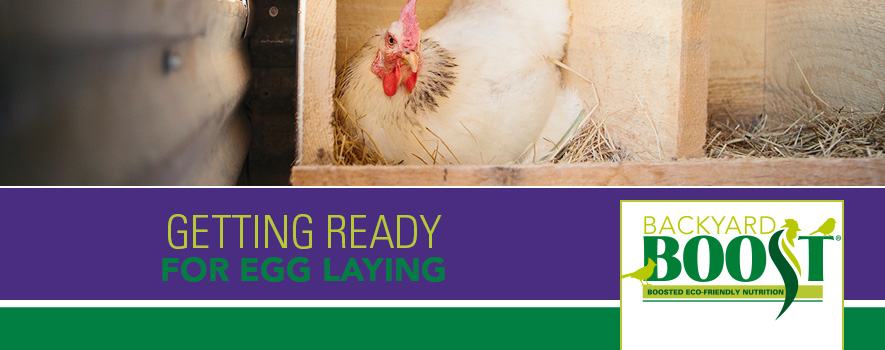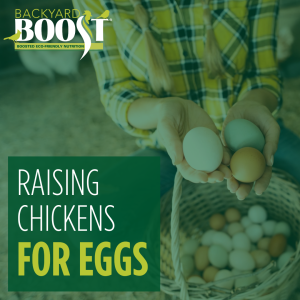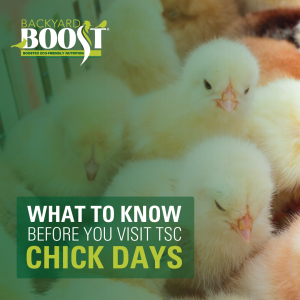
Baby chicks are cute, but as they grow into hens the real fun begins – they start laying eggs! It’s rewarding to go out to the coop a few times each day to find the latest egg in a nesting box just waiting for you. Fresh-laid eggs are a great nutritional source and taste delicious.
Hens will typically start laying eggs when they are about four months old. Most breeds lay one egg each day as it takes about 20 hours to form an egg. You will be able to tell your hens are ready to begin egg production when they start getting more vocal. They will cackle, crow and call out to the others in the flock as they begin laying. They will also settle onto their nest and might even strain a little.
All Boxed Up
Although nesting boxes are not necessary, they do provide a secure, clean place for your chickens to lay eggs. Nesting boxes are just what they sound like, open-front boxes that allow the birds a secure place to nest and leave their egg. You don’t need a box for every chicken, and industry standards call for one box for every 4 to 5 chickens. Nesting boxes should be about 12-inches cubed. If they are much bigger, more than one chicken might try to get in at a time, causing stress to the chickens or broken eggs.
Nesting boxes can be hand made with wood, or a variety of pre-made nesting boxes are available for purchase that are plastic or metal. The key is to be sure to have a roof, a front with a lip to keep the bedding material inside, and to have it placed at a good height.
Your nesting boxes should be placed slightly off the ground but should not be higher than your roosts. Chickens like to be high when they sleep and will go to the highest structure in the coop to sleep. If the boxes are higher than their roosts, they might start sleeping in the boxes, something you should avoid.
If possible, try to keep your nesting boxes away from the coop entrance, so your chickens can get their feet cleaned off before entering the box to help keep it clean. Keep the box bedded down with a dry material like pine shavings, shredded newspaper, straw, pine needles or dried leaves. The roof of the box should deter any chicken from pooping in the box, but you should still check for cleanliness and clean each box as needed. If an egg breaks in the box, clean it immediately to prevent chickens from breaking and eating other eggs that have been laid.
Old-time farmers used to draper burlap sacks over the front of their nesting boxes to provide extra darkness and a sense of security to the hens that were laying eggs. The burlap bags also helped provide warmth in the colder months. Today, some people put curtains up on their boxes. This is totally a personal preference.
Preparing for Eggs
If you have young hens that are first-time layers you might want to put a golf ball, easter egg or even a white rock in the nesting box so the chickens can see the faux egg and realize what the box is for. You will want to make sure to check for eggs at least twice a day until you know your hens’ laying patterns. Most people will check for eggs in the morning and in the evening. Leaving your eggs in the boxes for longer periods allows for more chances for pecking and breaking by other hens or predators.
Light helps keep your hens laying, and they need at least 12 hours a day; however, 14-16 hours is optimal. Especially in the shorter days of late fall and winter, you will want to add artificial light to your coop to help stimulate egg production. Keep the light consistent. If it is on a timer or if you are turning it on and off manually, it needs to come on the same time every day. Be sure the light doesn’t create too much heat that can cause a fire hazard or make your flock too uncomfortable.
Making Good Eggs
Healthy eggs come from healthy chickens and one way to ensure that your chickens lay high-quality, nutritional eggs is to provide your hens with good nutrition. Provide them with a daily nutritional supplement like Backyard Boost® Daily Essentials from BioZyme® Inc., a leader in animal nutrition.
Backyard Boost Daily Essentials is a pelleted protein supplement for poultry designed to maximize digestibility and egg production. You can include this supplement in your flock’s feed each day or scatter it about the yard to have your chickens peck it to help increase their overall health, leading to naturally improved eggshell and yolk quality.
Daily Essentials contains AO-Biotics® Amaferm®, a prebiotic research-proven to enhance digestibility. Other key benefits of this supplement is that it supports growth, feather quality and egg production.
If this is your first year with chickens or you’re an experienced “henthusiast” having a clean, properly placed and bedding nesting box with adequate light and providing your chickens with good nutrition, will help prepare you with superior egg production. Prepare your nesting box and give your birds boosted eco-friendly nutrition with Backyard Boost Daily Essentials.
To learn more about Amaferm or Daily Essentials or to discover where you can buy this product, visit www.backyardboost.co.

